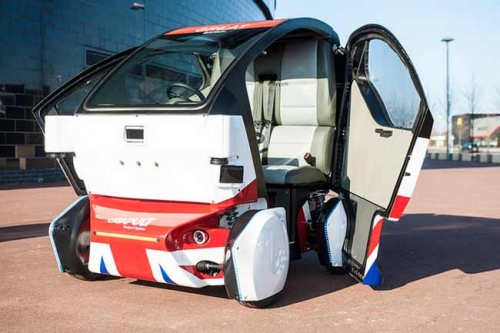
The first driverless car will be tested in Milton Keynes, Coventry, Bristol and Greenwich later this year in what could turn out to be a revolutionary experiment. The Lutz pod may look little more than a mobility scooter, and with a top speed of just 15mph, it’s amazing just how much debate this vehicle is causing.
Designed to help elderly shoppers and short journey commuters, the Lutz pod will be the first driverless car to take to pedestrianised roads. As we wait with anticipation to see how this tech will affect our day-to-day lives, many concerns have been raised as to how driverless cars will impact our car insurance policies.
If an incident occurs, who is to blame? If there is no one at the wheel to point the finger at, where do you turn to next? The manufacturer of the vehicle, perhaps? It may not even necessarily be the fault of the driverless car. Even if a careless driver were to bump into the back of a vehicle, the fallout would ripple across the industry. Why did the driver not intervene? Why did the sensors not detect what was happening?
Human error or programme glitch?
These super-smart cars are supposed to be safe, but are they as crash proof as we’ve been led to believe? Like any journeys on the roads, it only takes another reckless driver to cause a crash or an unavoidable hazard to appear in the road. Regardless of how competent you are as a driver, there are some things that you can’t avoid.
The creation of these futuristic vehicles has involved plenty of technical minds. Programmers who write the code for each vehicle and the various manufacturers that supply a multitude of parts could all be under fire if an accident was to occur. Regardless of how much clever technology has been used to prevent crashes, you can’t legislate for the erratic behaviour of other road users. These ultra-modern vehicles are likely to cost a lot of money in the early years of their development, and as such will be sharing the roads with standard, manually-controlled cars. Can the two coexist? It’s a fascinating debate.
We’ve already seen how a growing number of motorists are attempting to con insurance companies by “staging” crashes. It makes us wonder if fraudsters would find a way of manipulating the introduction of driverless cars in order to make bogus claims. We’re perhaps guilty of playing devil’s advocate here, but it’s something that car insurance consultants will need to consider in the near future.
There seems to be a great deal of scepticism surrounding driverless car technology in the UK. A recent survey by uSwitch found that 43% of drivers do not trust the new technology to keep them and their passengers safe when out on the road.
We’re often told that human error is cited for most road accidents, so taking that away from the equation should, in theory, make our roads safer. However, it seems that many of us remain to be convinced and it will be intriguing to see what happens once the driverless car tests are conducted later this year.
Comments
Go to blog index
